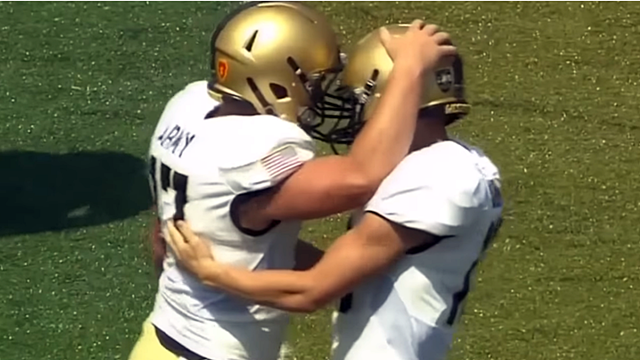
In two seasons, Jeff Monken has dramatically changed the culture and expectations surrounding West Point football. There was never any mystery in terms of what Monken was supposed to provide. Achieving his goals was the hard part, but Army has checked off nearly every box on a wish list of accomplishments:
— Consecutive wins over Navy
— Consecutive bowl wins
— Consecutive seasons with eight or more wins
— A 10-win season
— Army’s first Commander-in-Chief’s Trophy since 1996
Now, Monken faces an entirely different kind of challenge. Having reached the top of the Commander-in-Chief’s three-team battle for service academy supremacy, how will Army stay on top? Navy has set the standard in that regard, but as Monken has quickly shown, he knows how to overtake Navy and displace the boys in Annapolis. Now he has a chance to do so in a more prolonged way.
The very thing which has powered Army’s ascendancy in recent years — a relentless commitment to the ground game — will be profoundly tested this year for a counterintuitive reason: The quarterback will be different.
Army went through whole games last season in which it did not complete a pass. The Black Knights won a game last year in which they did not even attempt a pass. In the Armed Forces Bowl against San Diego State — a team with a highly-regarded rush defense — the Black Knights completed only one pass for six yards and had another pass intercepted.
No problem — they still rushed for 440 yards. They still scored 15 offensive points in the fourth quarter. They still scored in the final moments of regulation despite fighting the clock. They did whatever they wanted on the ground, whenever they wanted to and however they wanted to do it. The mind might easily think that a quarterback who doesn’t throw the ball can’t be THAT central to an offense, but as any triple-option student knows, the ball always starts in the quarterback’s hands. The quarterback’s decisions — fullback dive, keeper, or pitch — carry immense significance. A quarterback becoming polished in reading the defense and making the right decision is essential to the seamless, integrated quality of a triple-option offense. Clunky decisions and poor reads will shut down the operation. Reliable decision makers — as Navy saw with Keenan Reynolds, its foremost triple-option quarterback in the Ken Niumatalolo era — enable this ground-based offense to be lethal even when defenses are expecting a running play.
Army had that man the past two seasons: Ahmad Bradshaw.
He grew into the role during a difficult 2015 season, but in 2016, Bradshaw was ready to take the next step. He considerably improved his level of play and — when given the opportunity other Army quarterbacks such as Trent Steelman have had over the years: namely, to beat Navy — he came through and attained an iconic place in West Point football lore. He engineered a game-winning fourth-quarter touchdown drive to answer Navy’s inspired fourth-quarter surge. Bradshaw is a name synonymous with quarterback success for a gold and black team, but as a bomber to Lynn Swann and John Stallworth in the 1970s. Ahmad showed that a Bradshaw could lead the way on the ground and beat Navy at its own game.
Everything Bradshaw did in 2016, he did even better in 2017. Army’s dramatically raised national profile meant opponents would dig in even more to stop the Black Knights, but Bradshaw had answers to nearly all the questions opposing teams posed to his offense. Yes, the Black Knights’ defense was never better in 2017 than in its two Commander-in-Chief’s games against Air Force (shutout win) and Navy (only 13 points allowed), but Bradshaw still had to make clutch plays, especially in the snow against Navy. The Armed Forces Bowl against San Diego State was the final masterclass of a career which reached its apex in its final moments. Bradshaw — who could have played this year if he wanted to — said the game would be his last at West Point. It marked a way for him to go out on top and move on to the next phase of his life.
Now, Army has to move to the next phase of its football existence in the absence of No. 17.

Army controlled the ball in the Armed Forces Bowl for a whopping 46 minutes. San Diego State scored 35 points in 14 minutes of possession because Rashaad Penny, whom many felt should have been invited to the Heisman Trophy ceremony as a finalist, rushed for over 200 yards and was virtually impossible to stop. Army needed every one of those 46 minutes to win the game, because if the time of possession split had “merely” been 40-20, Penny might have had enough opportunities to break off another long run and approach 300 yards, giving the Aztecs one more touchdown which might have put the game out of reach.
Everyone knows what Army’s template is, and now a new quarterback has to make that template come to life.
Yes, outstanding performances from the offensive line shaped last year’s sensational season — that point can’t be forgotten in the midst of everything else — but the continuity Bradshaw developed with his line and his running backs formed the basis for the cohesive, durable and consistent ball-control offense Monken always envisioned when he came to West Point. Now that responsibility for developing chemistry with 10 offensive teammates falls on Hopkins and the other men who will battle him for the starting job.
If that piece doesn’t snugly fit into the puzzle, Army’s rise to the status of top dog in the Commander-in-Chief’s series won’t last very long. Jeff Monken knows precisely where he has to coach his hardest when preseason camp begins.

Be the first to comment